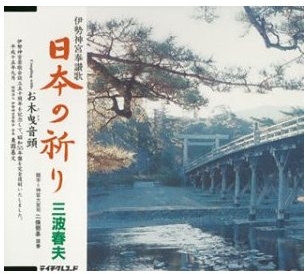Good grief, it’s been three and a half months since I’ve written anything here.
I’ve been distracted. As of mid-February, I’ve returned to the realm of full-time employment. Yay for positive cash flow! But now that I’ve settled into work, I want to show my poor, neglected blog some love.
In my last post, I said I would write more about kanji and hiragana, but I have no idea what I had intended to discuss. That’s what I get for saying “Next time, I’ll write about X.” Foolish. My dispatches would be less random as far as getting written if I went back to making them more random in terms of content. In that vein, this post has nothing to do with the Japanese writing system, although it is language-related.
Recently, I was poking around YouTube, looking for decent enka music, which is in much shorter supply than bad enka. In doing so, I came across Aiko Moriyama (森山愛子, Moriyama Aiko), whose work falls into both categories at once. Which is to say she’s a talented singer, but her songs tend toward melodramatic fluff. But the most notable thing about her is the enormous contrast between her speaking voice and her singing voice.
In conversation, Ms. Moriyama affects a ridiculously cutesy voice. It’s a good example of the phenomenon in modern Japanese society called burikko (ぶりっ子), in which women adopt artificially cute voices and behavior in an attempt to be appealing. Basically, in the same way that American society tells women that they need to be sexy, Japan prizes cuteness. The voices and mannerisms encouraged by the pressure to be cute range from subtle to grating. Moriyama’s speaking voice falls in the latter camp, but at least her behavior isn’t that bad.
Here’s the YouTube video in question.
I wonder if she talks like that just to make it a shock when she starts singing.
It’s beside the point, but here’s an attempt at translating the conversation and the song. The song is called Tokyo Banka (東京挽歌), meaning “Tokyo Elegy.”
Host: Ms. Yuki Nishino, thank you very much. Now to our next guest. Ms. Aiko Moriyama. Welcome.
Aiko: I’m glad to be here.
Host: Is this by any chance made from a kimono’s sash? It is, isn’t it?
Aiko: That’s right. This is an obi turned into a dress.
Host: Isn’t that clever.
Aiko: Isn’t it?
Host: Ms. Aiko Moriyama, you grew up in the town of Utsunomiya, is that right? Do you have any memories of summer in Utsunomiya from when you lived there?
Aiko: Well, Utsunomiya is surrounded by nature, so when summer vacation came, I’d go to the forest with my older brother who’s closest to my age, and we’d catch beetles. Or also, when we stayed at my grandmother’s house, we’d go to a river near by and catch crayfish. That sort of thing.
Host: Isn’t that nice! That’s the sort of summer you’d dream of. Now then, on to your new song.
Aiko: Yes.
Host: The title is “Tokyo Banka.” What sort of song is it?
Aiko: This song depicts someone who has left her hometown and moved to the capital to follow her dreams. And of course I also moved to Tokyo at age 18, right after graduating from high school, and worked to become a singer, although I did part-time jobs and took voice lessons first, but anyway it’s a song where I can superimpose myself over the character.
Host: I see. Well without further ado, we’ll have you sing it for us. This is Aiko Moriyama with “Tokyo Banka.” If you please.
Should I visit home, before the festival?
It’s not far, but it feels so distant
Right now even my grandfather
wouldn’t let me rub his shouldersHa~ e~ the madder red sky
Wiping away a tear
Tokyo ElegyWhite moonflowers, bottle gourd flowers
They would be blooming now and shaking in the rain
To follow my dream, I walk on aloneDetermination is tomorrow’s milepost
Ha~ e~ it’s so lonely
But damned if I’ll give up
Tokyo Elegy
Notes: I think the line “Right now even my grandfather wouldn’t let me rub his shoulders” implies that she left home against her family’s wishes and expects that she’d get a cold welcome if she visited them. I’m not sure how to interpret “determination is tomorrow’s milepost,” but that’s a direct translation. As for the conversation, the host and Aiko don’t actually say “Welcome” and “I’m glad to be here.” They both use a set phrase (“yoroshiku onegaishimasu“) that means something like “Please treat [me/it/them] well.” It’s used when you meet someone for the first time, when you’re working with someone, or when you’re placing someone or something in another person’s care.
